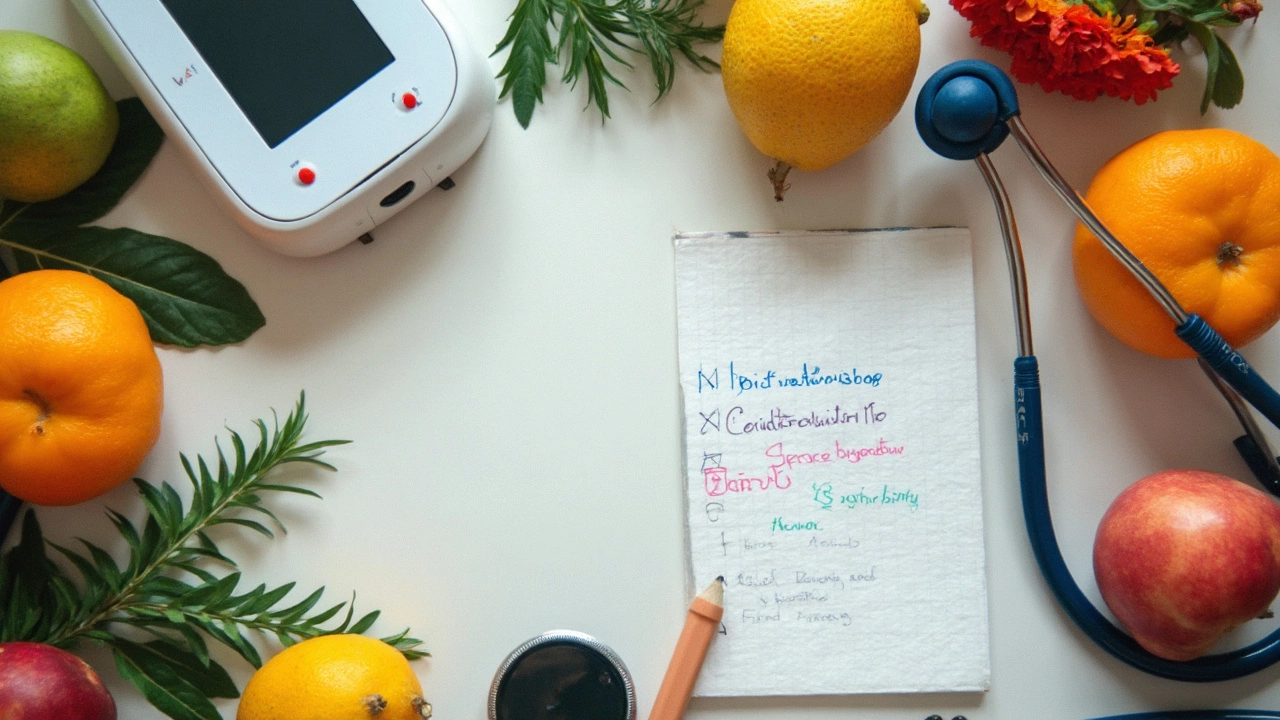Ever wondered if there’s one magic test that gives you a full scorecard on your health? Spoiler: there isn’t. Health isn’t like a car inspection where you can just check the brakes and lights and call it a day. Your body is way more complicated—and sneaky. A normal blood pressure doesn’t mean your cholesterol is in check. No fever today? That doesn’t mean your kidneys are happy.
Most people want a one-stop answer, but the reality is, doctors rely on a combo of basic bloodwork, body checks, and screenings to paint the full picture. That’s why you see so many "health checkup packages" that bundle tests for heart, liver, kidneys, blood sugar, and even secret stuff like thyroid or vitamin levels. Picking the right package isn’t about going for the one with the most tests, but about choosing the right mix for your age, gender, and family history.
Here’s the thing: skipping checkups because you feel totally fine is risky. A ton of issues—like diabetes, high blood pressure, even some cancers—lurk around without a single sign. Catching them before symptoms hit is where these checkups really earn their keep.
- Why No Single Test Tells the Full Story
- Smart Picks in a Health Checkup Package
- Tests That Catch What You Can’t Feel
- Hidden Pitfalls and What to Watch Out For
- Getting the Most Out of Your Health Screening
Why No Single Test Tells the Full Story
It’d be nice if there was just one test for overall health, but your body just isn’t that simple. Blood sugar might tell you how your body’s handling carbs, but it says nothing about your cholesterol. A basic hemoglobin check could flag anemia, but it ignores your liver and kidney function. Each body system has its own drama going on, often quietly.
Take this: Heart disease is the top cause of death worldwide, but you can pass a cholesterol test and still have blocked arteries. Diabetes? You’ll need a fasting blood sugar and maybe even an HbA1c test, not just a finger-prick glucose check. And then there are things like thyroid problems—easy to miss unless specifically tested.
Doctors use a mix of tests because issues rarely hang out alone. For example:
- High blood pressure can damage your kidneys, so just looking at BP misses the bigger picture without kidney tests.
- Liver trouble can mess up everything from digestion to hormones, often with zero symptoms until it’s serious.
- Even something simple like vitamin D deficiency—common in many people—won’t show up in standard blood tests unless you check for it.
Here’s a quick look at what the common health checkup and full body checkup tests actually cover:
| Test Type | Common Checks |
|---|---|
| Blood | Sugar, cholesterol, kidney & liver function, thyroid, vitamin D/B12 |
| Vitals | Blood pressure, pulse, BMI |
| Screenings | ECG (heart), ultrasound (abdomen), chest X-ray |
Bottom line: No one test reveals every hidden risk. That’s why a good health screening pulls info from across your whole body. Going for just a single test is like reading the first page of a novel and thinking you know the whole story.
Smart Picks in a Health Checkup Package
If you search for a health checkup or a good health checkup package, you'll see options loaded with dozens of tests. But here’s the lowdown: you don’t need every single add-on. You want the package that actually covers the basics that matter for your age and risk factors. So, what are the “can’t-miss” tests in a package meant to track your overall health?
- Complete blood count (CBC): This gives a snapshot of your red and white blood cells, hemoglobin, and platelets. It’s used to spot hidden infections, anemia, and some cancers.
- Blood sugar (FBS/HbA1c): A basic but crucial check for diabetes and blood sugar control.
- Liver and kidney function tests: Your main filters can struggle without you knowing. These tests call out trouble early.
- Lipid profile: Your cholesterol and triglycerides matter for heart disease risk. High numbers? That’s a warning flag.
- Thyroid profile: Thyroid issues sneak up and mess with energy, mood, weight, and even hair.
- Urine routine: Looks for infection, early kidney problems, or issues like diabetes that show up in your pee.
If you’re above 40, male or female, an ECG to check your heart’s rhythm and maybe a chest X-ray makes sense. Women should get breast and cervical cancer screenings, while men might need a prostate check after 50.
Here’s a quick table with what’s usually included and what it checks for:
| Test | What It Detects |
|---|---|
| CBC | Anemia, infection, blood disorders |
| Blood Sugar (FBS/HbA1c) | Diabetes, risk of complications |
| Liver Function | Liver health, hepatitis, early damage |
| Kidney Function | Kidney health, early failure |
| Lipid Profile | Cholesterol, risk for heart attack |
| Thyroid Profile | Thyroid imbalance |
| Urine Routine | Infection, diabetes, kidney issues |
Skip the fancy tests unless you’ve got specific symptoms or a doctor's advice. For most people, these basics in a full body checkup give a pretty solid health status—without burning a hole in your pocket.

Tests That Catch What You Can’t Feel
Here's the reality: a lot of serious health problems don't announce themselves with pain or obvious symptoms. Conditions like high cholesterol, type 2 diabetes, fatty liver, or early stage kidney issues can develop quietly, and by the time something feels off, real damage may already be done.
This is where smart health screenings—especially those found in a good health checkup package—really matter. They pick up warning signs you’d never notice on your own. For example, while diabetes can cause tiredness or weight changes down the line, most folks have zero clue their blood sugar is creeping up until a simple blood test says otherwise.
Here are a few tests in a full body checkup that scoop up silent risks:
- Blood Pressure: High blood pressure rarely shows symptoms but is a top risk for heart attack and stroke. A basic check could literally save your life.
- Lipid Profile: This tests your cholesterol and triglycerides. You won’t "feel" a cholesterol problem, but high numbers crank up your risk for heart disease.
- Blood Sugar (Fasting/Random/ HbA1c): These test if diabetes is sneaking up. The HbA1c reveals what your sugar levels have looked like over the last 3 months, even if you haven’t noticed any symptoms.
- Liver Function Test: Early liver problems almost never hurt or show up on the skin. A simple enzyme check can catch issues before things get serious.
- Kidney Function Test: Most people feel fine until there’s major kidney trouble. Creatinine and urea levels in your blood give the all-clear—or raise the flag way early.
- Thyroid Function Test (TSH, T3, T4): Thyroid hormone problems can mess with energy, mood, and weight—but these are easy to blame on life. Testing the hormones spots trouble way before it spirals.
Check out how common some of these silent problems are:
| Condition | % of Adults Without Symptoms |
|---|---|
| High Blood Pressure | 40%* |
| Diabetes (Type 2) | 30%* |
| High Cholesterol | 50%* |
*Estimates based on Indian health screening studies, 2023-24
The best health screening isn't just about "checking the boxes." It’s about spotting stuff that hides out, quietly building risk, even when you feel totally normal.
Hidden Pitfalls and What to Watch Out For
Booking a health checkup package feels simple. You just pick the most popular or the one with the biggest discount, right? Not so fast. There are a bunch of traps here, and falling for them means you might waste money or, worse, miss something serious.
First up: more tests aren’t always better. Some basic packages only cover things most people already know, like a CBC or routine sugar level. Big, fancy packages can load you up with strange tests you don’t really need. Example? A 25-year-old woman rarely needs a PSA (prostate cancer) test, but some places throw it in just to make the offer look bigger.
Some clinics keep the prices low by skipping key tests for your age or risk group. For example, adults over 40 should always get a lipid profile and blood sugar check, but sometimes these aren’t included unless you pay extra.
- Watch for "one-size-fits-all" packages that ignore your actual health risks.
- Fancy-sounding tests aren’t always useful unless there’s a specific reason for them.
- Results without a consult are useless. Getting a page of numbers and no doctor's advice leaves you guessing.
- No follow-up system? That’s a red flag. If the clinic won’t explain or guide you, don’t go there.
A surprising stat: In a survey of 1,000 people who booked health packages in India, about 40% had at least one test in their report that had no proven benefit for their age group. That’s a lot of wasted time and anxiety.
Double-check if your family history calls for special tests. Got close relatives with diabetes or heart problems? Make sure your health checkup (or full body checkup) includes those risk markers. And always ask about fasting requirements—wrong prep leads to wrong results, and that’s not just a rookie mistake, it’s common even among adults who’ve done checkups before.
Here’s a quick run-through of what you really want in a health screening package, sorted by age group:
| Age Group | Must-Have Tests |
|---|---|
| 20-30 | Blood counts, thyroid, sugar, basic lipid profile |
| 31-45 | All above + liver, kidney, blood pressure, ECG |
| 46+ | All above + PSA (men), mammogram (women), vitamin D, more detailed cardiac evaluation |
Bottom line: The best health checkup skips the noise and hits the essentials. Don’t get blinded by big menus or discounts. A smart package is personal, not just popular.

Getting the Most Out of Your Health Screening
If you’re shelling out for a health checkup, you want real value—not just a bunch of numbers in a report folder. So, how do you make sure your screening helps your actual health? Start before you even walk into the lab.
- Know what’s included. Make sure your full body checkup covers basics like blood sugar, cholesterol, blood pressure, liver and kidney function, and thyroid. If you’re at high risk due to family history or lifestyle, look for tests for diabetes, vitamin D, or heart risk panels.
- Time your screening right. Most accurate results come from fasting—usually 8–12 hours. Drink water, skip food and fancy coffee.
- Bring your history. Any past reports or medicine lists? Carry them. Doctors spot trends better that way, and you avoid repeat tests.
- Ask questions. Don’t just nod along to "normal" ranges. Ask the doc what your numbers mean for you, not the average person. What’s normal for a 25-year-old athlete isn’t the same for a 55-year-old with high blood pressure.
- Follow up. It sounds obvious, but so many people never get around to discussing results with their doctor. If a health screening flags something, put it on your calendar to check back in.
Here’s a quick look at how often most adults should consider some must-have health screening tests:
| Test Name | Frequency | Why It’s Useful |
|---|---|---|
| Blood Pressure | Every 1-2 years | Early warning for heart and kidney problems |
| Blood Sugar (Fasting or HbA1c) | Annually | Detects diabetes before symptoms start |
| Cholesterol | Every 4-6 years (more if high risk) | Spots hidden heart risks |
| Kidney/Liver Function | Annually | Many issues show up silently |
When you get your results, ask for simple explanations. Which numbers matter for your age and sex? If you’re only looking at the “reference range” and nothing else, you’re missing the big picture. And if your lifestyle or family history puts you at higher risk—say, you smoke, or diabetes runs in your family—bring that up. Your doctor might recommend extra checks or earlier follow-ups.
One more tip: don’t get obsessed with one-off results. Getting tested regularly—say, every year or two—lets you spot trends before something goes off the rails. And honestly, that’s what makes the best test for overall health not just a one-day thing, but a smart habit that keeps you ahead of the game.
